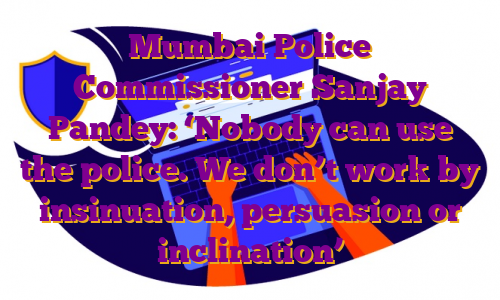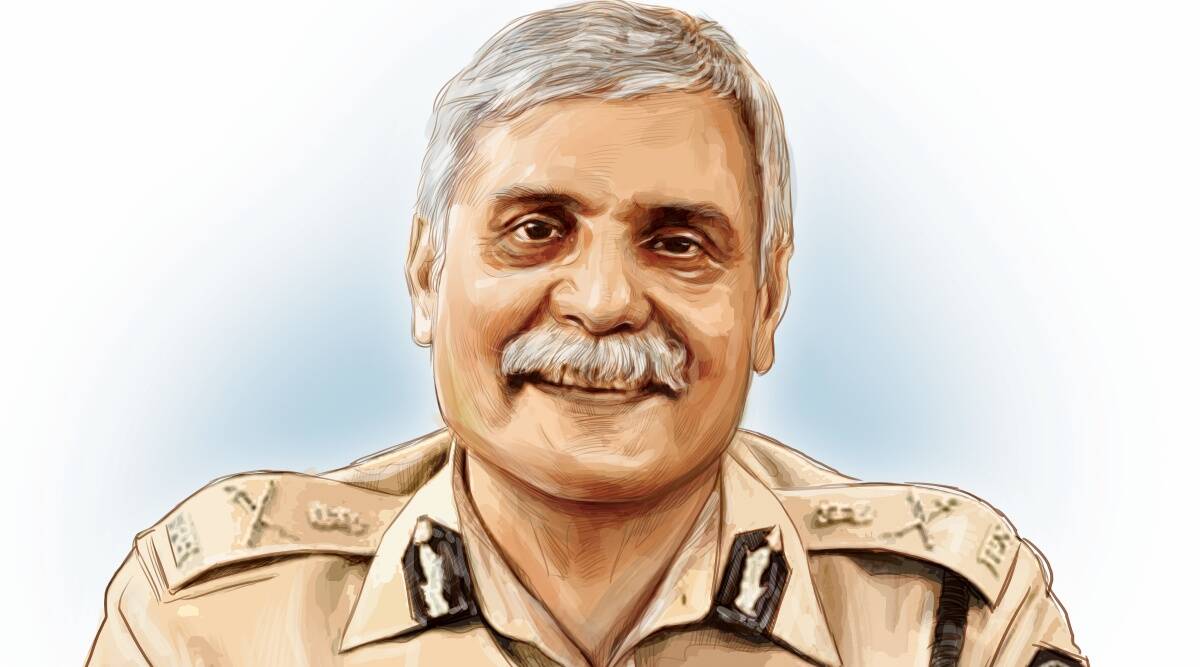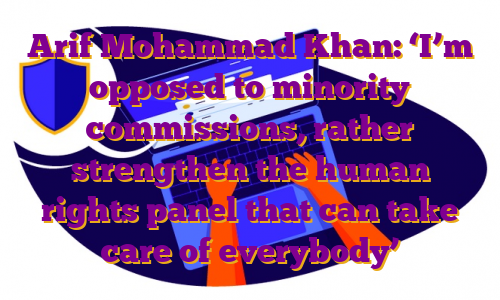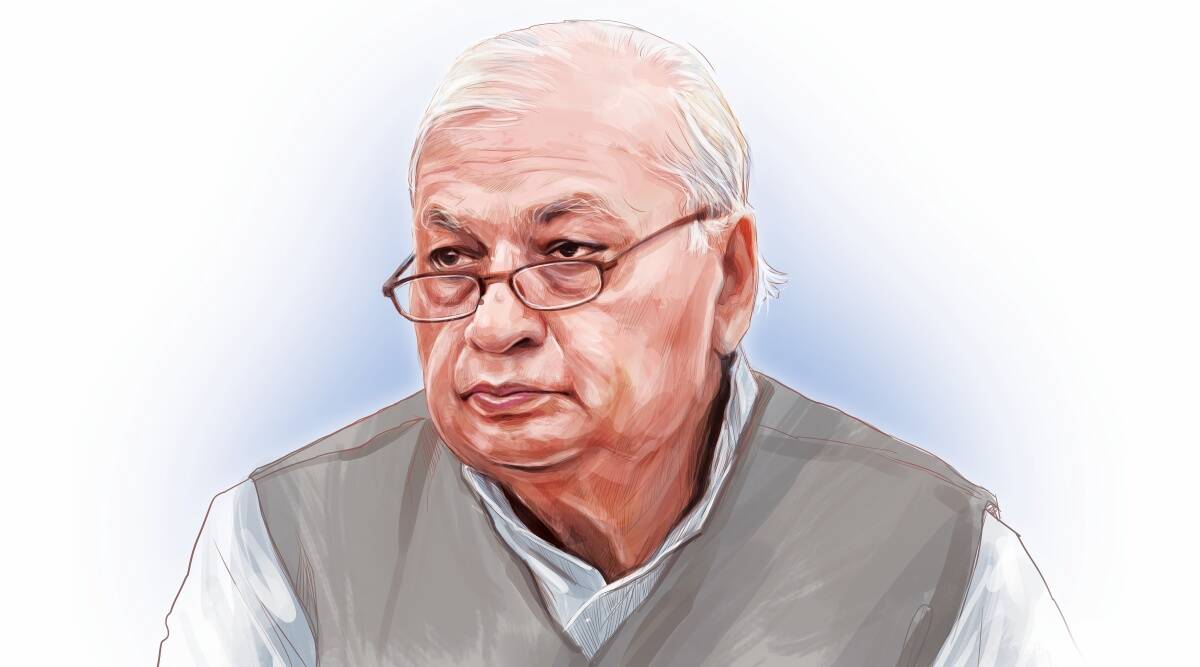Mumbai Police Commissioner Sanjay Pandey talks about the need to be responsive towards citizens, political interference in probes, playing by the rulebook
and his advocacy of a new Citizens’ Forum Bill. The session was moderated by Special Correspondent Mohamed Thaver.
Mohamed Thaver: The assumption, whenever a new police commissioner took charge of Mumbai, was that he’d go after traditional offences like street crimes. You have changed that image by connecting with citizens on social media, sharing your mobile number and focussing on issues like harassment by housing society committees and noise pollution. What’s the feedback?
As the Commissioner of Police, which is an executive charge, administration is one part of the role. But most of it is directed towards citizens. So, it was a no-brainer that I would follow the role as intended.When I joined as a DGP of Maharashtra, I had shared my number with all 2.25 lakh constables across the state. Now I have shared it with 2.5 crore citizens. Initially, I got hundreds of calls and text messages. Now I receive a minimum of 70 to 75 text messages every day. Footfalls have increased as I have encouraged people to walk into our office after 3 pm. So about 80 people show up every day. And then we have constables as well, 40 to 60 of whom I meet every day. I stay in office till the last person goes. I think our effectiveness down the line, as far as administration goes, has improved.
Mohamed Thaver: In the 90s, Mumbai was seen as the hotbed of the underworld and later, street crime. Is the crime spiral under control?Best of Express Premium Premium
Premium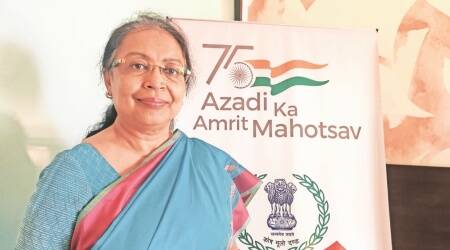 Premium
Premium Premium
Premium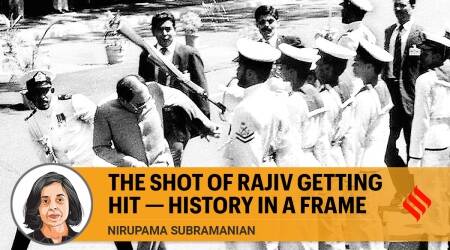 Premium
Premium
On my social media, you see talk about traffic, construction, noise pollution and so on. But what you’ve not seen and heard is our internal talk and briefings, which are basically on crime, from robberies, chain snatchings, motor vehicle thefts to house break-ins. Crime hasn’t come down but the control mechanisms are better and each offence is being registered.
🚨 Limited Time Offer | Express Premium with ad-lite for just Rs 2/ day 👉🏽 Click here to subscribe 🚨
Jayprakash Naidu: What about cybercrimes?
Cybercrime is huge because there are no physical boundaries or territoriality involved. The person can be sitting anywhere and start siphoning off money with a fake account. Tracking the criminal means we have to look at jurisdictions of various countries. Then various factors come into play such as extradition treaties and foreign relations. Today, you have to beg Google or Yahoo to get details and IP addresses. For arrests in cybercrime, the world has to come together. There has to be one law that should apply equally across all courts, wherever they are. All technology companies should follow the same law. Otherwise, somebody may make an app in some country and we don’t even get the IP address. As far as mobile numbers are there, we can trace them. But many of them are Voice-Over-IP, which comes through proxies.
Sandeep Singh: Local parties allege that Central agencies like ED and CBI are being used to settle political scores. Similarly, the Central party says that the Mumbai Police is being used for the same purpose. The Supreme Court has questioned even the sedition case against Maharashtra MP Navneet Rana. What do you say to such allegations?
I don’t think Mumbai Police is being used by anybody. If there was a cognisable case, we have registered one. We do not work by any insinuation, persuasion or inclination. There is a Maharashtra Government circular that no sedition case can be filed without the opinion of the public prosecutor. In this case also, there was a special prosecutor. It was on the basis of his opinion that the sedition case was filed. Now, the courts have said that wherever the circular has been applied, it should be held in abeyance. So, we follow that.
To arrest cybercrime, there has to be one law that should apply equally across all courts, wherever they are. All technology companies should then follow the same law
Zeeshan Shaikh: Your work as the DCP of Dharavi rattled many, especially people who are in power now. Have you changed or have they changed their opinion about you?
I don’t think I have changed a lot. But people who would have had misgivings about what I was doing in Dharavi, have seen my work. I think people have really seen that we have been following the law and are trying to comply with it.
Yogesh Naik: There was a point when you had quit the IPS. What made you come back despite the fact that you got sidetracked?
When I quit the service, there were administrative issues because of which I wasn’t really relieved in the manner that I should have been. There were certain dues such as the house-building advance and that was being charged at a penal rate of interest. That was the point when I withdrew my resignation. In 2006, I had opted for voluntary retirement. That again did not happen for four-and-a-half years. Then I re-joined in 2012 but came under the lens over whether I was a government or a private servant. That was settled in court. I’ve never objected to postings because I got the same salary. I only objected to the way you cannot overlook seniority.
As long as the rules of business have not changed and the Constitution remains where it is, I don’t see how the police could be affected. But there should be a fear of law and its enforcement
Shubhangi Khapre: Irrespective of the government in power, there has been an emphasis on police reforms in Maharashtra since the 1960s. Yet, we cannot stop political interference in appointments of officers and their transfers. Your views?
The key question is how you look at the police? Are you looking at the police as an independent body? The fact is it doesn’t exist on its own. Every police officer in the country is a government servant. The government comprises elected representatives, who are part of the Parliament or local Assemblies. If you are governing a state or city, would you not have your choices? So, there will be control. Until and unless you have a very seminal change in how the bureaucracy works, I think the idea of an independent police force is utopian and impractical in the current situation. The UPSC is an independent body but it is elected or selected by the government. So, the government has a prerogative.
Shubhangi Khapre: Do you think the former state finance minister Anil Deshmukh, who is facing allegations of wrongfully making transfers or misusing the police force for mobilising funds, is being targetted?
The matter is before the courts and it won’t be appropriate for me to talk. As I said, we are government servants and we have to follow government guidelines.
Sandeep Singh: Do you think more reforms are required?
You’re talking about rewriting the Constitution and the bureaucracy is defined by it. There are subjects within the purview of the Centre, State and Concurrent lists. If thought processes change, that is where you should start. Everything else is just semantics. You can tweak something here and there and bring in a neutral person. But ultimately, you remain a government servant and that’s exactly what I want to emphasise.
Until and unless you have a very seminal change in how the bureaucracy works, I think the idea of an independent police force is utopian and impractical in the current situation
Yogesh Naik: Do you think the attack on NCP chief Sharad Pawar’s house was a failure on the part of the Mumbai police?
We had an inquiry and we found out that there weren’t any great lapses.Yes, there was an issue with two or three of our people not being there at that time and we have addressed it. We cannot always be 100 per cent.
Mohamed Thaver: Recently, there has been a lot of communal tension due to loudspeakers in mosques. Given the communally charged atmosphere in the country today, do you see things improving or worsening?
People are more informed and aware about the result of any kind of violence or arson. Mumbai has seen it in 1992-93 and 2009. I would credit this knowledge to sharing of information, which has become much easier now. Earlier, we didn’t have social media as a connective tissue. It played a very big part as we could send out the right messages, build confidence and bring people together. Also, Mumbai is totally quiet because people have to earn their livelihood and cannot afford to keep fighting. Political parties have their ways and means but citizens have become more educated, informed and can judge for themselves. Everybody wants a peaceful life. That’s my basic premise.
Sadaf Modak: The Mumbai riots also revealed the communal bias among policemen. Does that continue?
The police are as communal as the local population. We also draw our people from the local population. We are as communal or ‘a-communal’ as citizens. But we are a disciplined force. And even during the riots in 1992-93, it was the policemen who brought them under control. There were just a few aberrations.
Rahul Sabharwal: In the aftermath of communal flare-ups, like the one in Khargone in Madhya Pradesh or Jahangirpuri in Delhi, we’ve seen the rule of the bulldozer replacing the rule of law in minority-dominated areas. Do you think this sort of punitive action undermines what the policing structure stands for?
This hasn’t happened in Mumbai, so to comment on other cities will be totally out of context. The police all across India are governed by the Indian Penal Code and the Criminal Procedure Code. And they lay down the guidelines for action.
Jayprakash Naidu: Recently, there was a communal incident in the eastern suburbs of Mumbai. How can we prevent such flare-ups from spiralling out of control?
Isolated groups and aberrations always exist in society and they can be controlled. But I must give full credit to both communities who were mature enough to handle the situation in Mankhurd and Malwani. Few people are too overzealous, not driven by any fervour but perhaps just goaded by their own situation. Some people want to be in the news and create a nuisance. Besides, if an incident was intended to mean something, it would not have happened at 3 am but in broad daylight. Just because it happened outside a masjid, we call it communal. Stray incidents can happen anywhere. We have arrested all the instigators and offenders with the help of both communities.
Zeeshan Shaikh: Perhaps the police tend to get blamed in communal incidents because there is poor representation of minorities in the force. Do you think there needs to be a diversity policy?
I am really not a voter of representative policing. Any Indian citizen can join the police force or the bureaucracy, they are open for everybody. If there are certain people who do not want to join, that’s their issue. If you put percentages in appointments, it will make the structure more communal rather than being harmonious. Since there’s no restriction in terms of selection, anybody can apply. I think that independence is the beauty of our bureaucracy and should remain exactly that way.
Sagar Rajput: You have stopped the towing of vehicles…
Where are the roads in Mumbai? We’ve just got two roads. And where is the parking? Even my car got towed away when I took my family to the Gateway of India. You can impose fines and enforce laws but provide the facilities first. Build parking lots, build roads first. Mumbai has probably crossed the population density to an extent that it cannot afford people buying any more cars. I have said that there should be a moratorium on how many cars you can have. Towing is adding to a citizen’s day-to-day concerns. I can’t drive, I can’t park, so where do I go? We are now towing abandoned cars. Certainly, if you park in front of the signal, we will tow it. But we are not mandating it.
A parking authority is coming up but when there is no space, how will it prevent such congestion? And my point is that should the city grow in the manner it is growing? In certain areas, Mumbai has reached a critical saturation level and does not need any more construction.
Our suburbs should expand and grow beyond Lokhandwala or Four Bungalows. They should be Panvel and New Bombay. There should be no-construction, car-free and noise-free zones in Mumbai now.
Mohamed Thaver: Recently, a lot of BJP leaders alleged that the Police Commissioner is working at the behest of the ruling coalition. How would you respond to that?
I don’t think I have gone after anybody with a clear agenda being given by anybody. As I said, as a policeman, one has to work within the framework of the law. Some complaints were made during my tenure, the other complaints were made before. These have been duly looked into, chargesheeted and seriously investigated. When this incident of reciting religious sermons came up, we registered cases against the ruling party as well. Show me where we have been one-sided.
Sandeep Singh: In the case of Mohit Kamboj, who was accused of defrauding the Indian Overseas Bank, the Mumbai police has said it will go ahead with the probe although the bank has withdrawn its complaint against him. Why so?
We work under the total control of the judiciary. When you register a case, it goes to the magistrate. Once the case is lost and given to us, the party, which has made the complaint, has no role, no locus standi, as per the law. He only becomes my witness. I’m supposed to do the investigation after registering the FIR. Now it is up to the court. A settlement could happen before the court, not before the police. We’re talking about public money. And that’s the complaint made by a particular bank. Today, it can say the money is not lost but then it should say so before the court. We will be very happy to close the case, don’t we already have other work? But as of now, we don’t have the right.
Mohamed Thaver: We have seen FIRs being registered against certain people, especially in political cases, but most of them have got court protection against their arrests. How would you respond to this move?
Some of the cases we are investigating are cheating cases. Courts have very clearly said that an arrest must be based on documents. An arrest is required only for recovery, where the criminal knows where he has kept the stolen property. In cases that we were dealing with, there was no reason to arrest and there was no reason for recovery.
Wherever there is a need, we are doing our job. That’s the natural course of an investigation. An arrest is not a punishment, it is just to keep the person away from influencing an investigation. It’s unfortunate if we have not been able to lay hands on certain people but it’s not by design.
Sandeep Singh: Over the last two years, controversies surrounding Paramvir Singh and Sachin Vaze have tarnished the image of the Mumbai police. How has this affected morale down the line?
These are not happening for the first time. The Mumbai city police has 45,000 personnel and the Maharashtra police strength is about 2.25 lakh. How many people have been in controversies? May be just six? The morale of the police force is not made up of a few individuals. I am a firm believer that the system has been built within the framework of law and has a structure which helps you function and take care of aberrations. As long as the rules of business have not changed and the Constitution remains where it is, I don’t see how the general moral fabric of any organisation could be affected.
Jayprakash Naidu: During your online interactions on Facebook, you’ve talked about the Citizen Forum Bill, which should be placed in Parliament. Why do we need such a legislation?
I am a firm believer that citizens need to be empowered. After much effort we have formed a forum with regional and zonal heads. And now citizens themselves have drafted a Bill that talks about the citizens’ rights and the Government’s duties vis-a-vis their rights. It’s going to the Government as a proposal from the citizens themselves. And it has very clearly defined what the structure of the forum will be, what wards will be represented, how zones and regions will find a place. It includes suggestions on the election process and grievance redressal. In fact, this is not my idea. Earlier, there was a Nagar Raj Bill. Karnataka already has something of this sort.
We are setting up a trust which will fund all the forum’s activities. I have proposed looking at funding and educating students from kindergarten to the fifth grade in ethics and moral science. That’s my suggestion to the board. The Bill also defines punishment and cognisable offences.
Zeeshan Shaikh: The NYPD has a budget of around $2.5 billion. London also has a massive budget. Is the Mumbai police adequately funded?
I don’t think more policing, infrastructure or investment can bring safety and security to our citizens. The Mumbai police is adequately funded, has the required infrastructure and manpower, which have to be optimised. Gone are the days when you talk about one-to-one policing. In most global cities, you won’t see a cop. Now monitoring is technology-enabled; we’ve gone beyond the camera and are talking about bigger things like Artificial Intelligence (AI), face-mapping and photo-matching. But above all, there should be a fear of law and its enforcement. Then, I won’t need these many people on the ground. How many criminals, who have committed two to three crimes, do you think there are? Not more than 3,000. How many policemen do you require for that number?
!function(f,b,e,v,n,t,s)
{if(f.fbq)return;n=f.fbq=function(){n.callMethod?
n.callMethod.apply(n,arguments):n.queue.push(arguments)};
if(!f._fbq)f._fbq=n;n.push=n;n.loaded=!0;n.version=’2.0′;
n.queue=[];t=b.createElement(e);t.async=!0;
t.src=v;s=b.getElementsByTagName(e)[0];
s.parentNode.insertBefore(t,s)}(window, document,’script’,
‘https://connect.facebook.net/en_US/fbevents.js’);
fbq(‘init’, ‘444470064056909’);
fbq(‘track’, ‘PageView’);
.

